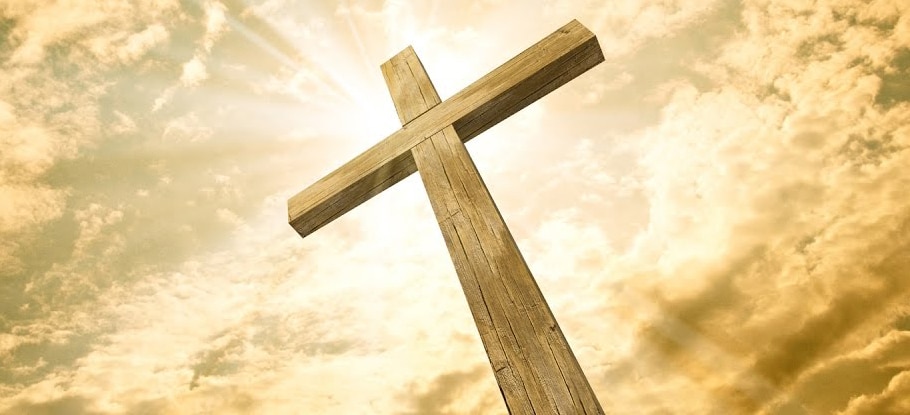Several years ago, The Shack by William Young made headlines because of his use of “God” as a character in his story that did not align with the clear teachings of the Bible. It likewise denied key doctrines such as hell and the substitutionary death of Jesus on the cross. When William Young was asked during an interview if he believes that Jesus Christ was the punishment for sin and a sacrifice on the cross, he responded by asking, “Uhuh…by who?” The man conducting the interview said, “By the Father.” Young responded, “Why would the Father punish His Son?”
Why was the death of Jesus on the cross significant? What made his death stand out over the multitudes of others who were put to death on the wooden cross that was known as “the infamous stake” among the Romans?
The Wrath of God was Satisfied
Although the cross has become the iconic symbol for Christianity and many people wear it as a piece of jewelry, for the first century Jew the cross was nothing more than a symbol of death. Everyone knew that the Roman cross was a sure death penalty with zero possibility of survival. The Phoenicians, Carthaginians, and Egyptians had all practiced torture and death penalty with the use of a cross, but it was the Romans who perfected it.
Some seven centuries before the birth of Jesus, Isaiah, the greatest prophet of the Old Testament days of Israel, penned these words:
Yet it was the will of the LORD to crush him; he has put him to grief (Is. 53:10).
For many skeptics, the scene of the cross is nothing more than cosmic child abuse. They cannot imagine how a good and loving God could put his own Son to death in such a ruthless manner. Famed atheist Richard Dawkins writes the following:
The God of the Old Testament is arguably the most unpleasant character in all fiction: jealous and proud of it; a petty, unjust, unforgiving control-freak; a vindictive, bloodthirsty ethnic cleanser; a misogynistic, homophobic, racist, infanticidal, genocidal, filicidal, pestilential, megalomaniacal, sadomasochistic, capriciously malevolent bully. [1]
However, the reason why the death of Jesus on the cross doesn’t make sense to atheists like Dawkins is because they have an improper understanding of the wrath of God as connected to the justice of God and the need for holy justice to be perfectly satisfied. Since humans are all guilty of sin (Rom. 3:23), there is no means of reconciliation to God outside of a perfect sacrifice.
The sacrifice of bulls and goats is insufficient to take away all of the sins of all of God’s people—which brings us to the reality that such a dilemma required the death of God’s Son as a substitute for sinners. J.C. Ryle writes, “The sufferings described in it [the crucifixion] would fill our minds with mingled horror and compassion if they had been inflicted on one who was only a man like ourselves. But when we reflect that the sufferer was the eternal Son of God, we are lost in wonder and amazement.” [2]
Sinners Were Reconciled to God
When we celebrate Good Fridayas Christians—it’s not because we enjoy the image of Jesus dying on the Romans’ infamous stake. The picture of Jesus’ butchered body nailed to a cruel cross on a hillside is hardly a joyful image. The reason Good Fridayis so good is because of what actually happened on that day.
The grand truths related to our salvation such as justification, sanctification, and glorification—are all possible because of the death of Jesus in our place. Without Jesus’ substitutionary death, we would never be welcomed in God’s sight. Instead, he would look upon us as enemies. Peter writes these words to encourage believers who were struggling under intense pressures and persecution, “For Christ also suffered once for sins, the righteous for the unrighteous, that he might bring us to God, being put to death in the flesh but made alive in the spirit” (1 Pet. 3:18). Isaac Watts described the death of Jesus with eloquent precision:
Alas, and did my Saviour bleed?
And did my Sov’reign die?
Would He devote that sacred head
For such a worm as I?
As Christ died on the cross in our place, he became a curse for us (Gal. 3:13) in order that he might bring peace between guilty sinners and our sovereign God (1 John 2:1-2). As Jesus died on the cross, while in immense pain and agony, he cried out, “Father, forgive them for they know not what they do” (Luke 23:34). As Peter made clear, Jesus’ death was necessary for the great exchange—where he would receive our sins and where we would receive his righteousness (1 Pet. 2:24). As the scene of Jesus’ crucifixion reached its culmination with darkness covering the sky in the middle of the day—Jesus cried out with a loud voice, “It is finished” (John 19:30)! This was the announcement that every one of the sins of all of God’s people were paid for in the suffering death of Jesus.
Through the death of Jesus, we are brought near to God and our position changes. We are no longer enemies of God! Jerry Bridges observes the following about the cross of Jesus:
It is at the cross where God’s Law and God’s grace are both most brilliantly displayed, where His justice and His mercy are both glorified. But it is also at the cross where we are most humbled. It is at the cross where we admit to God and to ourselves that there is absolutely nothing we can do to earn or merit our salvation. [3]
- Richard Dawkins, The God Delusion,(London: Bantam Press, 2006), 51
- J.C. Ryle, Mark (Expository Thoughts on the Gospels), (Wheaton: Crossway, 1993).
- Jerry Bridges, The Gospel for Real Life: Turn to the Liberating Power of the Cross…Every Day, (Colorado Springs: NavPress, 2003).




